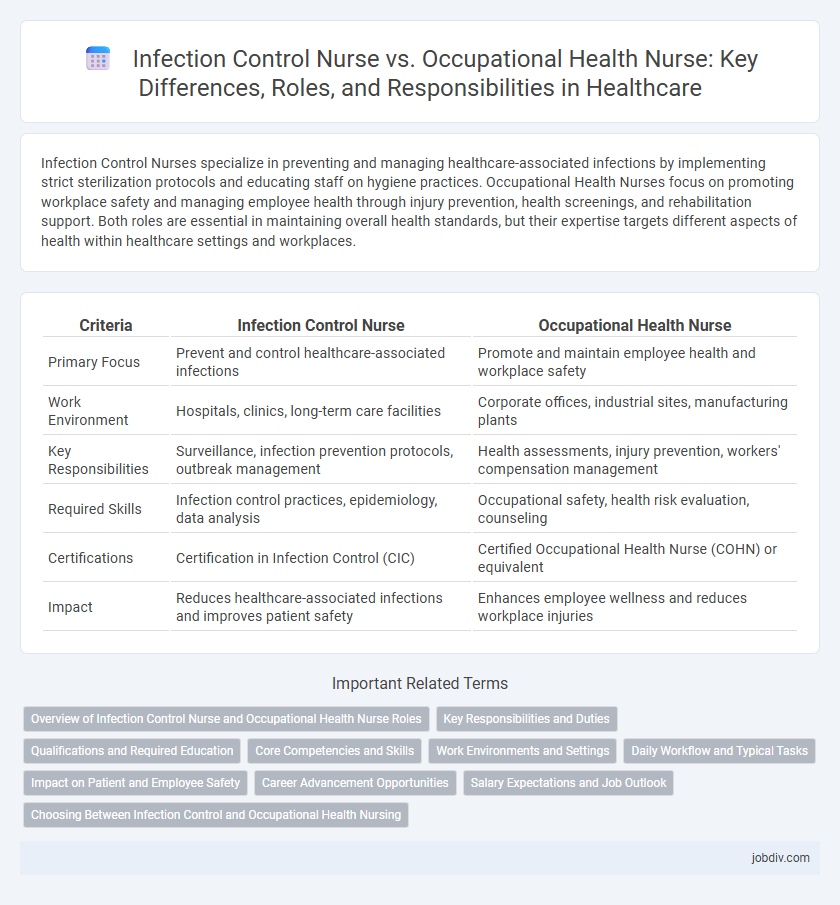Infection Control Nurses specialize in preventing and managing healthcare-associated infections by implementing strict sterilization protocols and educating staff on hygiene practices. Occupational Health Nurses focus on promoting workplace safety and managing employee health through injury prevention, health screenings, and rehabilitation support. Both roles are essential in maintaining overall health standards, but their expertise targets different aspects of health within healthcare settings and workplaces.
Table of Comparison
| Criteria | Infection Control Nurse | Occupational Health Nurse |
|---|---|---|
| Primary Focus | Prevent and control healthcare-associated infections | Promote and maintain employee health and workplace safety |
| Work Environment | Hospitals, clinics, long-term care facilities | Corporate offices, industrial sites, manufacturing plants |
| Key Responsibilities | Surveillance, infection prevention protocols, outbreak management | Health assessments, injury prevention, workers' compensation management |
| Required Skills | Infection control practices, epidemiology, data analysis | Occupational safety, health risk evaluation, counseling |
| Certifications | Certification in Infection Control (CIC) | Certified Occupational Health Nurse (COHN) or equivalent |
| Impact | Reduces healthcare-associated infections and improves patient safety | Enhances employee wellness and reduces workplace injuries |
Overview of Infection Control Nurse and Occupational Health Nurse Roles
Infection Control Nurses specialize in preventing and managing healthcare-associated infections through surveillance, staff education, and implementing infection control protocols. Occupational Health Nurses focus on promoting workplace health and safety by assessing employee health risks, managing work-related injuries, and facilitating rehabilitation and compliance with occupational health regulations. Both roles are critical in maintaining health standards but differ in their primary focus, with Infection Control Nurses targeting patient-centered infection prevention and Occupational Health Nurses addressing employee workplace health.
Key Responsibilities and Duties
Infection Control Nurses specialize in preventing and managing healthcare-associated infections by implementing sterilization protocols, monitoring infection rates, and educating staff on hygiene practices. Occupational Health Nurses focus on promoting workplace safety through injury prevention, conducting health screenings, and managing employee wellness programs. Both roles collaborate to enhance patient and employee health by mitigating risks related to infections and occupational hazards.
Qualifications and Required Education
Infection Control Nurses typically require a registered nursing (RN) license, specialized certification such as the Certification in Infection Control (CIC), and often hold a Bachelor of Science in Nursing (BSN) degree with additional training in epidemiology and microbiology. Occupational Health Nurses need an RN license, certification like the Certified Occupational Health Nurse (COHN) or COHN-S (Specialist), and usually possess a BSN degree with coursework in industrial hygiene, toxicology, and workplace safety. Both roles demand clinical experience, but Infection Control Nurses focus more on disease prevention protocols in healthcare settings, while Occupational Health Nurses emphasize employee health and safety regulations.
Core Competencies and Skills
Infection Control Nurses specialize in surveillance, prevention, and management of healthcare-associated infections, mastering skills like epidemiology, microbiology, and outbreak investigation. Occupational Health Nurses focus on workplace health promotion, risk assessment, and employee wellness, with core competencies in injury prevention, health education, and regulatory compliance. Both roles require strong clinical judgment, patient education abilities, and collaboration with multidisciplinary teams to ensure safety and health standards.
Work Environments and Settings
Infection Control Nurses primarily work in acute care hospitals, long-term care facilities, and outpatient clinics, focusing on preventing and managing healthcare-associated infections. Occupational Health Nurses are typically employed in industrial sites, corporate offices, and manufacturing plants, where they promote workplace health, conduct employee health assessments, and manage work-related injuries. Both roles require expertise in health regulations and safety protocols but differ in their settings and specific health priorities.
Daily Workflow and Typical Tasks
Infection Control Nurses focus on monitoring and preventing hospital-acquired infections through surveillance, data analysis, and staff education on hygiene protocols. Occupational Health Nurses conduct workplace health assessments, manage injury prevention programs, and coordinate employee health screenings to maintain workforce well-being. Both roles require collaboration with healthcare teams, but Infection Control Nurses prioritize infection outbreak control, while Occupational Health Nurses emphasize overall employee health and safety.
Impact on Patient and Employee Safety
Infection Control Nurses implement protocols that significantly reduce healthcare-associated infections, directly enhancing patient safety by minimizing exposure to infectious agents. Occupational Health Nurses focus on monitoring and preventing workplace hazards, ensuring employee well-being and reducing absenteeism caused by illness or injury. Both roles are critical in fostering a safe healthcare environment, with Infection Control Nurses targeting patient-related risks and Occupational Health Nurses safeguarding staff health.
Career Advancement Opportunities
Infection Control Nurses often advance into roles such as Infection Preventionists, Epidemiologists, or Director of Infection Control, leveraging specialized expertise to influence hospital-wide safety policies. Occupational Health Nurses can progress to positions like Occupational Health Manager, Safety Consultant, or Corporate Wellness Director, focusing on employee health programs and regulatory compliance. Both pathways offer leadership roles, but career advancement in infection control emphasizes epidemiology and risk mitigation, while occupational health prioritizes workplace wellness and preventive care strategies.
Salary Expectations and Job Outlook
Infection Control Nurses typically earn an average salary ranging from $70,000 to $95,000 annually, reflecting high demand due to increasing healthcare-associated infections. Occupational Health Nurses command salaries between $65,000 and $90,000, driven by workplace safety regulations and employer health programs. Job outlook for Infection Control Nurses is projected to grow by 15% over the next decade, while Occupational Health Nursing positions are expected to increase by 11%, highlighting strong career stability in both fields.
Choosing Between Infection Control and Occupational Health Nursing
Infection Control Nurses specialize in preventing and managing healthcare-associated infections through surveillance, staff education, and implementing infection prevention protocols, primarily in clinical settings. Occupational Health Nurses focus on employee health and safety by assessing workplace hazards, promoting wellness programs, and managing work-related injuries and illnesses. Choosing between these nursing specialties depends on one's interest in infection prevention within healthcare environments versus a broader focus on workplace health and safety across various industries.
Infection Control Nurse vs Occupational Health Nurse Infographic

 jobdiv.com
jobdiv.com